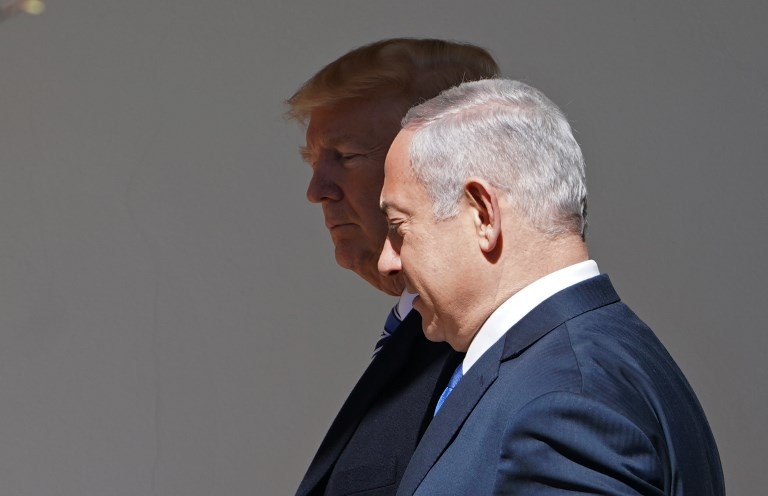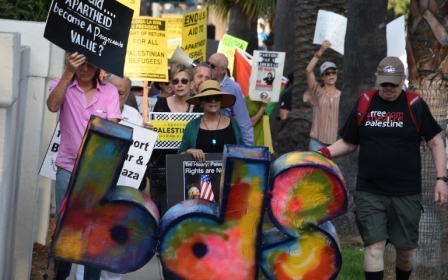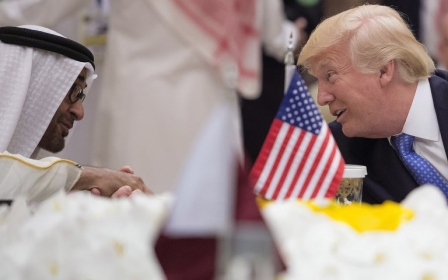Trump and Israel: Right-wing populism is the perfect partner for occupation

Israel’s strange influence in Washington and the Arab region entered a new stage with US President Donald Trump’s ascent to power. Already exploiting the vacuum left by Arab uprisings to cement its occupation, Israel received open-ended, irrational support for the occupation from Trump.
Israel is routinely trampling Palestinians’ rights under the almost-free political insurance policy provided by the White House. The state of Israel has built a geopolitical fantasy upon the fictional premise that Palestinians will someday renounce all of their rights - even that they will leave their land.
No one has faith anymore that this approach, which insists on the present Israeli occupation as the de facto starting point in meaningless negotiations with the Palestinians, will foster peace.
Rising populism
Over the years, Israel has developed a distinct logic of occupation beyond historical, fundamentalist Zionism. Neither reasonable voices within Israel, nor global criticism, have hindered the ambitions of this “occupation geopolitics” and theology.
Israel has been aided by the rising wave of populism and the far-right in Europe and the US, along with the wave of totalitarianism that swept through the Middle East after status-quo actors defeated the Arab uprisings. To the Israeli geopolitical mentality, the zeitgeist in the region and the wider world presents a vulgar, but fertile, ground for deepening the occupation.
Unless Israel, which has succumbed to a prison administration mentality, faces a new intifada or receives serious pressure from regional states, the status quo will persist
This backdrop has facilitated the US embassy move to Jerusalem, routine massacres in Gaza, and the disregarding of Palestinians as interlocutors. Israel has reduced the entire problem to a simple cost-benefit analysis, allowing the status quo to survive in its favour. Unless Israel, which has succumbed to a prison administration mentality, faces a new intifada or receives serious pressure from regional states, the status quo will persist.
Israel does not see the vicious cycle that other actors are warning about, because it is mired in a problematic mental state that has worsened since Trump took office. This schizophrenic condition allows Israel to mentally live in Washington but physically reside in the Middle East.
In an age where conquests have become obsolete, Israel, which has maintained the longest occupation in the modern era, can be at peace with this condition only if it lives in the past.
Palestinian politics
Meanwhile, Israeli Prime Minister Benjamin Netanyahu and Trump can present the occupation as a success story, as such a shallow perspective has not met wide opposition in an era when geopolitics have been reduced to the issue of post-9/11 “terrorism”.
Motivated by a blind “Islamist-phobia”, the Gulf and Egypt have positioned themselves in the Trump-Netanyahu axis in the post-Arab Spring period, reducing the prospects for an end to the occupation.
The state of Palestinian factions also invites pessimism. To guarantee that a meaningful negotiations process will not start, Israel has gone to great lengths to ensure that Palestinian groups do not transform from resistance movements into representative political actors. Such primitive reasoning guided efforts by Israel and the US to prevent Hamas from taking power after it won the 2006 elections.
However, there is no excuse for the failure of Palestinian groups to become more politically mature. The crisis of representation after Yasser Arafat’s death threw all Palestinian groups into a vicious cycle. In the meantime, Arab governments who viewed the Palestinian problem as a burden after the Arab Spring made matters worse.
Radical democratic shift
At this point, we cannot expect a paradigm shift in Israel/Palestine. After the Trump administration's "human rights exit" at the UN, the US has officially declared that it cannot be an honest broker for Palestinians. Furthermore, the US, EU, UN and regional states have neither the vision nor the motivation to navigate towards a solution.
Only one actor can make revolutionary strides towards solving the problem: the Palestinians. Notwithstanding the heavy cost of the occupation, a democratic shift in Palestine’s political representation could upset the Trump-Netanyahu axis. If their vision is limited to maximising power, Palestinian factions will be unable to pull out of their current skid.
The worn-out perspective of “unifying” disparate Palestinian groups has lost its meaning. Palestinians are in urgent need of meaningful political representation and a radical democratic shift.
Building a new Palestinian political language will be the first step towards breaking Israel’s approach, which is to deepen the occupation and kill all hopes for peace.
- Taha Ozhan is a member of the Turkish parliament and a former chairman of its foreign affairs committee. He is an academic and writer and holds a PhD in politics and international relations. He frequently comments and writes for international media. His latest book is Turkey and the Crisis of Sykes-Picot Order (2015).
The views expressed in this article belong to the author and do not necessarily reflect the editorial policy of Middle East Eye.
Photo: US President Donald Trump and Israeli Prime Minister Benjamin Netanyahu are pictured in Washington on 5 March 2018 (AFP)
New MEE newsletter: Jerusalem Dispatch
Sign up to get the latest insights and analysis on Israel-Palestine, alongside Turkey Unpacked and other MEE newsletters
Middle East Eye delivers independent and unrivalled coverage and analysis of the Middle East, North Africa and beyond. To learn more about republishing this content and the associated fees, please fill out this form. More about MEE can be found here.






